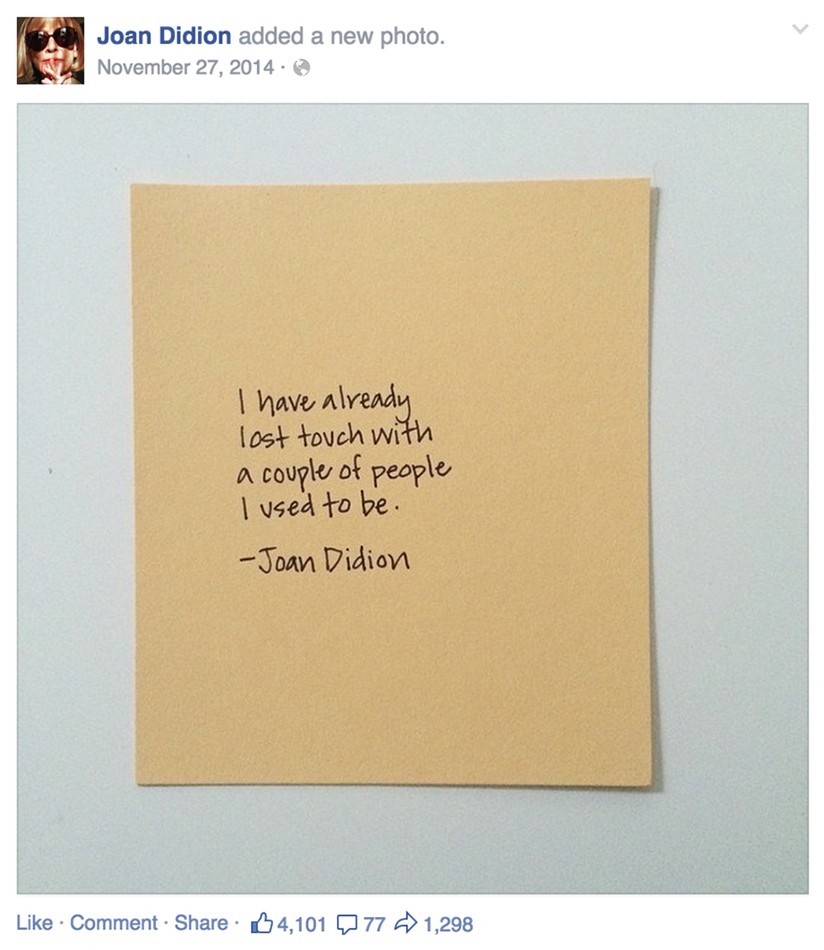Free Joan Didion
by Haley Mlotek

All human life is subject to trends, or maybe the more accurate term is “patterns,” but the more I look, the more annoyed I become; where once I would have seen consensus, I now only see cliché. This is what scientists call “aging,” and if I’m correct, it involves a complete and full-body exhaustion towards the things, places, and people that once brought you a kind of compulsive and consuming energy.
But this is also the reason I’m so opposed to the idea of distance, critical or otherwise; I do think we should put our foot down every so often and say something that will no doubt embarrass us in ten years. When people ask me if they should get tattoos, I always say yes; when people ask me if they should write weird, controversial things, I always say yes; if they should dye their hair, accept a job, move to a faraway place, yes. I am an enabler of the highest order, because making these mistakes — tattoos, hair dye, jobs, and writing are all equally terrible mistakes, no exceptions — are the best ways to mark time. “I thought that was a good idea?” is the most powerful statement ever uttered in the history of history.
So I’m curious about the bad decisions we all make, and the ripple effects that occur when enough people of a certain community decide to more or less unanimously embrace a thing, place, or person as the sole representative of humanity’s most intangible qualities: taste, intellect, beauty, and the thing that pervades all of those positive attributes, worthiness. If we are tasteful and smart and beautiful, we maybe, perhaps become worthy of the attention we crave; but how, the community wonders, can we communicate all of those ephemeral ideas inside one physical body or presence?
The answer is Joan Didion. Or at least she’s the answer for a certain type of person, and of course, this being an essay written by a young white woman in her late twenties, I not-so-secretly mean a certain type of me. Joan Didion is a living stereotype and I only mean that in the most literal definition of the term: Joan Didion functions as a mental shortcut. Joan Didion requires very little explanation to a very large group of people, representing a class of consumers who tend to be young, female, upper middle class, white, and somewhat inwardly tortured, a group of people that just so happen overlap with the people who point to the game-changing minimalist chic clothing of Phoebe Philo, current designer of Céline, as evidence of their taste, without actually buying or wearing any of her designs.
The decision to marry these two living shortcuts into an advertisement was a kind of fashion synergy we see maybe once every five years; a time when one cultural arbiter meets another in unexpected and perfect harmony, when two complimentary aesthetics meet in both brands and humans. The image was perfect. The intentions of the brand behind the ad were, I felt, a trolling of the most epic order. There is only a slight difference between “trolling” and “knowing your audience better than they know themselves,” and Céline walks that line perfectly: a case of correlation not being causation. I didn’t feel trolled because Céline was mocking me, or us, but because I had been so thoroughly and effectively target marketed, an experience that is like being a deer in branded headlights. We’ve been seen! I panicked. They know too much!
So what is it that Céline knows about what we know about Joan Didion? I would personally say that we know Joan Didion as a kind of artist who achieved something most people never do in their own lifetime: a fevered, passionate, entirely unexamined fandom that treats Didion and her work as fait accompli, a fact no longer up for debate, or at least not up for debate if you want a seat at a certain table.
The question is not if Joan Didion deserves this praise. Joan Didion is one of the greatest writers Western culture has ever produced or had, and that is, it’s true, not up for debate. She is a writer who makes people buy books; whose name functions as a euphemism for a certain kind of writing style; who has created some of the most pervasive cliches within and about writing. Her legacy is settled: She has become important, definitive, something greater than a single person or article or book can ever be.
In the process of beatifying Didion, we’ve lost our ability to see her as a person and a writer who wrote some things that lots of people think are very good, the end. This is completely anecdotal, but in the last year or so I’ve had numerous conversations with intelligent, reasonable women who have leaned across dimly lit bars to whisper, “I don’t think I like [redacted],” Joan Didion being one of those names, as though this were shameful. The other names included books that “everyone” loved, writers “everyone” read, people who write essays or fiction or biographies or run blogs or edit magazines but who are by means saints or gods, categories of people that you can’t disparage in a normal speaking voice lest a vengeful force throw a lightning bolt right into your heart. “I don’t think I like Knausgaard,” they whisper, as though anyone has ever legitimately enjoyed reading a volume about his struggles.
As a classic enabler, it is my job in these situations to validate this as a worthy choice. But you know what? It is! Not liking Joan Didion is fine. Even not reading Joan Didion is fine. It is the obligatory aspect of this unexamined fandom that rankles me, because we should all do what we want all the time and never apologize for it, and that is only a slight exaggeration.
I mean, I’m guilty of it too. I keep my elected representatives prominently displayed on my coffee tables and bookshelves and all over my tweets and shit just in case anybody forgets that I read Susan Sontag, that I have a pathological obsession with Chris Kraus, as though these signifiers are supposed to tell you something really, really important about me. As though you’re supposed to understand something without me having to say it to you first.
These people are never just people, they’re deliberate choices held up as icons for some purpose greater than their simple existence, and like most things humans do, the act of choosing says much, much more about the choosers than the choices. The act of anointing Joan Didion as our favorite, our best, our everything, is the act that reveals what we’re trying to say: that we’re cool, that we’re educated, that if we are not young and white and slender and well-dressed and disaffected and sad and committed to the art of writing as an arduous and soul-sucking process that must be endured yet Instagrammed simultaneously, then we will be, at least, as close as possible to those identifiers even if it kills us.
Joan Didion, as a writer, is the perfect cipher for the writing process: that mythical time of creation where you are consumed by a painful, wrenching, autonomous urge to lay bare your thoughts, and the resulting sentences are beautiful enough to take away the breath of anyone lucky enough to read them. They remove all oxygen from the writer, leaving only a shell of a woman at her most beautiful: frail, small, weighted down only by a silky dress and nothing as obtrusive as actual human flesh. But it is not, I maintain, Didion’s responsibility to correct this mob mentality. And it is not by any means her fault, despite the opinions of her detractors.
In 1979, Barbara Grizzutti Harrison published her essay railing against Didion, ostensibly — though it seems like an indictment of the people who like Didion more than a critique of Didion herself. “Didion’s ‘style’ is a bag of tricks,” Harrison writes, and then produces a series of sentences parodying Play It As It Lays; she accuses Didion of only ever writing about herself, even when she’s supposed to be reporting on a crime; and at the end, Harrison concludes that “Didion’s heart is cold,” the ultimate crime for a woman.
The whole thing is smart, and well-written, but it reads like Harrison lost a dinner party debate and is listing all the things she wished she had remembered to say when a chorus of friends and colleagues jumped in to defend Didion. For me, the cruelest sentence is the first: “When I am asked why I do not find Joan Didion appealing, I am tempted to answer — not entirely facetiously — that my charity does not naturally extend itself to someone whose lavender love seats match exactly the potted orchids on her mantel, someone who has porcelain elephant end tables, someone who has chosen to burden her daughter with the name Quintana Roo; I am disinclined to find endearing a chronicler of the 1960s who is beset by migraines that can be triggered by her decorator’s having pleated instead of gathered her new dining room curtains.”
This is almost unbearably painful to read for reasons I’m sure Harrison would have me executed for: there I am! Right in that sentence! There’s my Instagram account, with the page of the Sontag journal I’m currently reading held just so you can see my fresh manicure; there’s my collection of zines propped up conspicuously on the dresser in my bedroom, so visitors can see my eclectic taste; there’s my writing, carefully constrained sentences that hint at my mental health issues, my sex life, my recreational drug use, revealing my inherent coolness while pretending to casually conceal it. My sympathies lie with my aesthetics, my possessions, my personality bending to material whims and tasteful trends, and not the other way around.

I once spoke, honestly and without irony, with a friend of mine who maintained a very popular Tumblr account. (LET ME FINISH.) She took submissions and said she was shocked at how often people submitted ads as inspiring fashion content; didn’t they know they were being sold something? Well, yes, I conceded, but — how was that different than an editorial? Aren’t we being sold something then, even if it’s just a myth or feeling as opposed to a literal object?
I would go one step further and say that Vogue — because I suppose all roads do lead to Vogue — sells us something on every page, even if it’s just the idea that Anna Wintour writes her monthly editors’ letter, or that beautiful starlets are gracious hosts to prying journalists, or that a glamorous vacation to an underdeveloped nation is our birthright as Westerners draped in caftans, or that a magazine pushing the aspirational nature of wealth is not always dripping in blood.
It is a sad truth that the prize for living long enough is to see the things and people and artworks that you loved with the pure unfettered abandon of a child taken and mined for commerce, mass distribution, and cynical re-appropriation by brands, in order to be sold back to the next generation as pure, complete, whole elements of beauty and inspiration, but I also mean: who fucking cares. The promise of perfection, of minimalism, of simplicity, is a promise that invites you to discourage with complexity because complexity is the place where you’ll have to decide something for yourself. “Keep it simple” is code for “don’t think about this too hard,” and not thinking too hard is a sedative as powerful as anything pharmaceutical.
What I want, and this is what I want for myself and for all of my fellow sad young literary girls, is to be able to read something without it fundamentally altering how you write or read or talk about the things you like, to invite more nuance and more complexity to everything, to over-examine your likes and dislikes and hold them to the highest scrutiny, until you are the thing that stays still in a turning world of people who can keep themselves still as well.
I suppose here is the place where I should cite everyone’s favorite Didion essay, the one she wrote about a devastating psychological truth not only beautifully but also famously to an exact character count. “The charms that work on others count for nothing in that devastatingly well-lit back alley where one keeps assignations with oneself: no winning smiles will do here, no prettily drawn lists of good intentions,” she solemnly intoned, and I would only humbly add that those charms include the performance of electing a certain shortcut to stand in for the person you want to present to the world; that there is no artist, writer, or person who is entitled to an unexamined and unchallenged love; and that we are ultimately responsible for what Didion reminded us was called character, that there is no image or brand or text that will ever be an effective placeholder for our own personality, no thing that will give you permission to be the person you want to be. No more stories, she wrote, in order to live.
Update: The image above, captured from the official Joan Didion Facebook account, was originally created and posted to Instagram by Kelly Beall.
Capital Ventured

The two hundred and twenty million dollars in venture capital given to Instacart, a grocery delivery service that deploys human servants to retrieve goods from the shelves of existing grocery stores, seems less like an investment in the validity of its specific idea — which is stupid and unsustainable for reasons so blatant that they are not even worth discussing here — than in the broader idea of the quasi-permanent establishment of a new and semi-willing servant class defined nearly equally by its piecemeal semi-employment and its function in transporting things (people, objects, pets), at least until it is wholly displaced by a teeming bundle of machine vision and route optimization algorithms coursing through the circuitry of a fleet of drones that will be constructed using capital from the same small group of people that built this new servant class, only to tear it down and trample all over it with their beautiful replica Nike Air Mags delivered straight from an app.
Photo by TheGiantVermin
New York City, January 11, 2015

★★★ A flock of little sunlit white clouds swooped up in a curve in the west. Gradually but not altogether slowly they were replaced by a solid rippling cover of clouds, darkening the morning and lunch. Then, downriver, the water and the sky brightened a little. In the new apartment tower, the column of rooms with south-facing windows lit up with a pale bare-concrete color, while the neighboring spaces stayed dark. Full sun came on, hopeful light, giving an airplane and a helicopter their colors, closing distances. Looking west on 66th Street, the towers in New Jersey seemed to be just a few blocks ahead. Out in the forecourt as twilight came up, a soapy wand swiped through the cold air made bubbles that plopped straight down to the bricks. Then the three-year-old breathed through the bubble gear, and the new ones floated.
The Nine Most Shocking Revelations in the Palantir Leak

Yikes, this one is going to hurt: “Leaked Palantir Doc Reveals Uses, Specific Functions And Key Clients.”
“TechCrunch has received a private document from 2013 which reveals [Palantir’s] extensive trove of data analysis tools and lists many of its key clients,” the site says. This is Palantir, the data analysis company that contracts with the government and military. Palantir, the enterprise software company to our nation’s most secretive agencies. Palantir, the Peter Thiel brainchild. Palantir, the defense contractor named after Tolkien’s magical seeing stones. Let’s see:
1. Palantir allows “litigators and the police to make connections otherwise invisible”
2. Palantir “provides users with what seems like a revolutionary interface”
3. “Detectives love the type of information it [Palantir] provides. They can now do things that we could not do before. They can now exactly see great information and the links between events and people. It’s brought great success to LAPD. It supports the cops on the streets and the officers doing the investigations. It is a great tool. They are becoming more efficient and more effective cops. Palantir is allowing them to better serve the public.”
4. Palantir “is a smarter way of displaying data for analysis by humans.”
5. Palantir “is even able to provide immunity to fraud thanks to strategies the founders learned while still at PayPal.”
6. Palantir is recommended by “96% of the surveyed war fighters in Afghanistan”
7. “Without Palantir, [insurgents] would have already moved onto a different location by the time the field agents received the results.”
8. Palantir is, according to a former marine and current military contractor, “the combination of every analytical tool you could ever dream of. You will know every single bad guy in your area.” (This leaked quote appears in a Businessweek company profile from 2011.)
9. Palantir’s “data solution works equally as well in more pedestrian pursuits.”
That’s not all: “this document [which is literally a fucking investor’s prospectus] likely only gives a glimpse into Palantir’s true capability and reach.”
Will Palantir ever recover from this devastating breach?
Everything's Better When It Comes in A Combo
by Awl Sponsors
Brought to you by Jack in the Box® .
Two is better than one. And some things are best consumed in a combination to deliver maximum benefits than either one would on its own. To prove our point, we’ve rounded up some epic pairs that are just meant to be. What do you think?
1. TV and Netflix
With a TV and Netflix combo, there’s no need to leave your house over the weekend. You can watch your favorite TV shows and thousands of movies for a monthly cost lower than a trip to the theatre, binge–watchers unite!
2. Texting and Emojis
Forget having to write it out, Emoticons (mostly known as Emojis) are the best way to portray your mood or facial expressions via little illustrated characters. Texting wouldn’t be as fun without the smartphone icons that are taking over the world and redefining how we communicate.
3. Sundays and Football
Sundays spent watching your favorite team beat their opponent are the perfect weekend game changers. Whether you’re hoping to win your fantasy league or are recovering from Saturday night, nothing beats kicking back with a chilled bev and friends.
4. Sunroofs and Subwoofers
We’re all about that bass, and fresh air. A panoramic view and your favorite track make the ultimate cruising combo for a road trip or a shorter distance drive to your local Jack in the Box®.
5. Jack in the Box® Chipotle Chicken Club with Fries and a Drink
It’s hard to deny a good comeback, especially The Chipotle Chicken Club Combo at Jack in the Box®. It’s got crispy chicken, the Chipotle sauce you love and hickory–smoked bacon all on toasty sourdough bread. The mouth-watering, wallet-friendly combo comes with fries and a drink, for just $4.99. We couldn’t think of a more perfect pair. Visit jackinthebox.com/locations to visit your local Jack in the Box® and grab yourself your own Chipotle Chicken Club combo.
Please check your local Jack in the Box® for participating locations.
Forest
I was jogging once on a dirt road that cut through a forest. It was quiet and each of my footsteps landed with a soft crunch. Eventually I came upon a man walking with a big walking stick. It was a tree branch, really, one that he’d apparently picked up on his way. It was as long as he was, this stick, which was not so very long. I was taller than him and I am short. He was older, maybe 65.
He was walking in the same direction that I was jogging and as I approached from behind him I saw that he was wearing headphones — the big kind, that cover your ears like ear muffs. He couldn’t hear me coming, I could tell.
It was a small road, one car-width, but I gave myself as much berth as I could — five feet between us. I didn’t want to startle him.
I startled him.
“Hey!” He shouted, and stopped, and spun towards me, swinging the stick up over his head, holding it in both hands like an axe. His eyes were wild in panic.
I slowed to stop and raised my hands, palms toward him, to show him I meant no harm. His eyes calmed and he lowered the stick. He shook his head, bewildered at himself, and said, ashamed, “I’m sorry, I’m sorry. My fault. I got scared.”
He spoke louder than he had to, because of the headphones.
I smiled and told him it was okay and kept jogging.
(Previously.)
When a Door-to-Door Vacuum Salesman Has an Existential Crisis in Your Living Room
by Matthew J.X. Malady

People drop things on the Internet and run all the time. So we have to ask. In this edition, writer Ijeoma Oluo tells us more about what happens when you let a stranger with a vacuum into your home.
No matter how much the Kirby dude compliments your hair, don’t let him in. I’m like 5 years older than I was when he knocked on my door.
— Ijeoma Oluo (@IjeomaOluo) January 3, 2015
Ijeoma! So what happened here?
Many people believe the dreaded Kirby salesman to be a relic of the past — middle-aged men with bowler hats and worn suitcases, staying at cheap motels and lamenting failing marriages. But today’s door-to-door salesman looks a bit different. I have had experience with Kirby Salesmen before; my cousin had done a short stint after he got out of jail. The salesman who knocked on my door around 5:30 p.m. had the same desperate, slightly meth-y look to him. I knew that I needed to find a way out of this.
“Nope. No, sorry,” I said as I tried to shut the door. But before I could, another salesman, apparently the boss, appeared like magic. Horrible, dark magic.
“Oh wow, you have the best hair I’ve ever seen,” he said. “It’s absolutely amazing.” There must be some sort of training manual that says if you run across a black woman, compliment her hair. Ugh, I’m such a sucker.
I let them in with the promise that there was absolutely no way I would buy a vacuum.
“Great!” the boss said as the other salesman rushed past me with the vacuum. “I’ve got to go to another appointment, and I’ll come get him when you are done.” He jumped in the van and drove off with the urgency of the getaway driver at a bank robbery.
So then I was stuck with this poor kid, as he rambled on and on about this fucking vacuum. It was hilarious because I don’t have any carpet. None. Not a single inch of carpet. I have absolutely no use for a vacuum. I thought this would make the visit go more quickly. But I was wrong. He vacuumed my chairs, my couch, my windowsills — he even offered to vacuum the cat. I should have let him vacuum the cat; it probably would have gotten the whole mess over with sooner, knowing the general disposition of my cat. I opened a bottle of wine and began to drink.
How did you get rid of him?
When he started vacuuming the kids’ beds, I’d had enough (side note: my younger son had peed the bed the night before, and it was a little hilarious to watch this dude act like he didn’t notice). I told him that I had to get the kids to bed. The kids heard that and screamed: “No! Mom it’s winter break! You said we could stay up late!”
“I don’t know what they are talking about,” I said as I tried to telepathically tell the kids to shut the fuck up. “These kids. Anyway, you have to go.”
I thought that would be it, but it wasn’t. He had to call his boss. His boss said he’d be right there. Which meant he would arrive in approximately three years. This poor salesman had run out of things to vacuum. He disassembled and reassembled the vacuum a few times. Showed me every attachment twice, and then when he ran out of things to do he sat down across from me.
“What’s it like to be an adult?” He asked.
I’m sure I looked extraordinarily confused, so he added: “I’m only nineteen. I’m scared of becoming an adult. You are an adult. What is it like?”
It was getting pretty late, and this kid was asking me the meaning of life. By then I’d drunk half a bottle of wine. I resigned myself to the fact that I was never getting out of this. He was never going to leave. He lived here now. I was either going to have to introduce him to the kids as their new father, or I’d have to just grab the kids and run out the back door barefoot. I could get a different house — start over someplace new and never answer my door again.
I was just finishing up giving this salesman/teenager some of the world’s worst life advice when his boss showed up. He took his shoes off like he lived here now as well, sat at my table without asking, wrote up an estimate, and handed it to me. I choked on my wine with laughter. $3,500. For a vacuum. A thing that sucks up dirt. For a woman who doesn’t have carpet. Then when I literally said, “You’ve got to be fucking kidding me,” the price had dropped by half. Ok, now I was just pissed. Even if I owned all the carpet in the world and the price dropped to five dollars, I was not going to buy this vacuum.
After I said no about eighty times and literally just stood at my open door motioning for them to exit, they begrudgingly left at 9:30 p.m. That may not seem very late, but you must remember that they had arrived at the dawn of time.
Lesson learned (if any)?
Do not, under any circumstances, let a Kirby salesman into your home. In fact, if a dude you don’t know knocks on your door and starts to say any word starting with the letter “K,” shout “NO MEANS NO” and slam the door as quickly as possible. I don’t care if your name is Karen or Kyle and maybe it’s just someone delivering a package — it’s not worth the risk.
Just one more thing.
Want a little adult life advice? Ok here goes:
• At no point in your life will you look around and say, “I’m a grownup.” It never happens. You will never feel it. If you do, you are likely the world’s least interesting human.
• Do not ever take a potty-training kid to Disneyland. Wait until they have that shit (literally) down. Your kid will crap his pants on every ride that’s farthest from the restroom in order to punish you for such hubris.
• When you move in with a partner, only one of you is allowed to care about the decorating, so figure out who that person is before you cohabitate. If you both have ideas about where that rug should go or what color that wall should be — just break up now while you still like each other.
• Timeshares are never a good investment.
Photo by Erna Bouillion
Join the Tell Us More Street Team today! Have you spotted a tweet or some other web thing that you think would make for a perfect Tell Us More column?Get in touch through the Tell Us More tip line.
Teeming Metropolis Abandoned

Imagine, if you will, a city inhabited not by people, but solely by money. It might look a little bit like Manhattan, which is, admittedly, still in transition to this new, more pure plane of existence:
“Twenty-four percent of co-op and condo apartments citywide are not the primary residence of their owners,” said George V. Sweeting, the deputy director of the budget office, who oversaw the research. “Not all of these units are pieds-à-terre; many are likely owned by investors or original sponsors renting out the units.” In Manhattan, the number of non-primary residences is slightly higher than the citywide average, 29 percent, and in some neighborhoods favored by investors, such as Midtown, the share of nonprimary residences ranged as high as 44 percent.
The figures may be underestimates, since the agency did not include apartment buildings that receive 421a tax exemptions, which leaves out some more recently built condos that are widely known to have high concentrations of foreign buyers, including One57 and 15 Central Park West.
Half-empty buildings, star-less restaurants, but parties, those are always packed.
The Internet Is Terrible Because Of Everyone: A Continuing Series
For someone who believes that everything is terrible and only getting worse, and that what we see on the web is both fulcrum and paradigm of that horrific progression, I spend a lot of time thinking about and discussing the Internet and its awfulness. Perhaps it is masochism. Perhaps it is the manifestation of a desire to somehow identify the source of the increasing terror that is corroding our souls. Perhaps it is a combination of the two. Regardless, my continuing examinations into the nightmare of our existence in the digital space and its spillover into our waking life have already resulted in the discovery of Balk’s Law (“Everything you hate about The Internet is actually everything you hate about people.”) and more recently yielded a further realization which, in consultation with a team of advisers, is still being refined, but that I feel is too important to keep from the population at large until it has been fully developed.
I want to repeat the caveat that this is highly theoretical and its ultimate implications have not yet been rationalized, and also warn you that there is a good deal of technical imprecision to the theory as it currently exists, but if you are willing to look past those exceptions we can proceed. Okay. At some point, probably in the ’80s, probably in The Book of Questions or one of the myriad knock-off versions, a query was posed about whether you would actually want to know the totality of what other people genuinely thought regarding your appearance, temperament and behaviors, instead of the sliver that they, bound by the dictates of courtesy and tact, expressed in your presence. The premise behind the question was the idea that society is only held together by a massive state of denial in which we consciously disregard the low esteem other people have for our assortment of generally disagreeable personality traits while maintaining a thick internal file of our various collected disdain for everyone else’s. This is not particularly groundbreaking in its understanding of the cognitive dissonance necessary to avoid widespread psychic paralysis but it was a recent reminder of the question that brought me to what I am tentatively denominating Balk’s Second Law. What I realized was that the worst thing isn’t knowing what everyone thinks about you. No, Balk’s Second Law puts it this way: The worst thing is knowing what everyone thinks about anything. And here is where we see the true malignant force that drives the Internet: It is the purest mechanism yet through which everyone can express every idiot opinion they have about everything to everyone else. I will not even get into all the metacognitive aspects of this or the terrible ways in which we classify all these opinions, the derisiveness of which is its own kind of awfulness. No, for now I just want you to let this sink in for a second: The Internet is poisoning you every day with its constant gush of idiot opinion from the vast waste-ridden tide of people who need to be reminded to shut their mouths while breathing. It is terrible and only getting worse, and the various forms of social media are only amplifying the process and hastening us toward our inevitable end.
That said, even I have to admit that there was something indescribably beautiful this weekend to watching a bunch of Dallas Cowboy fans bitch and moan on Twitter, without any sense of irony or self-awareness, about how a bad call robbed them of a playoff victory. Hahahaha! Suck it, you ignorant sacks! I hope bitterness tastes good, because that is all you will have to eat for another year. Hahahaha! Losers!
